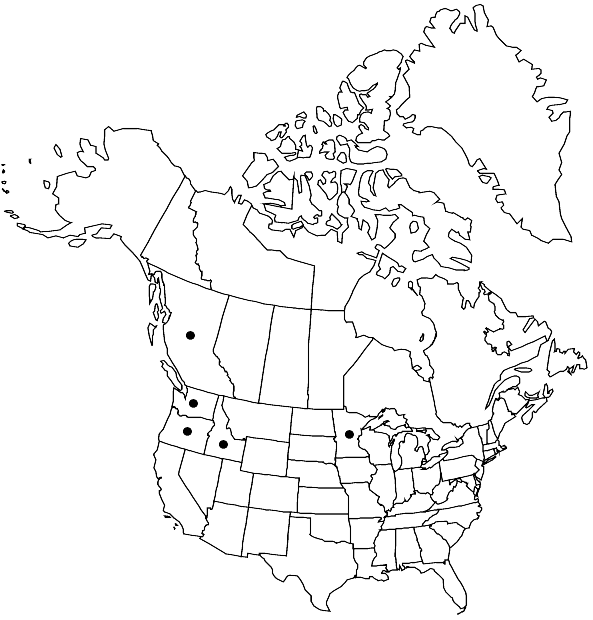Difference between revisions of "Ceratodon purpureus subsp. conicus"
Stud. Handb. Brit. Mosses, 68. 1896,.
FNA>Volume Importer |
imported>Volume Importer |
||
| (6 intermediate revisions by 2 users not shown) | |||
| Line 6: | Line 6: | ||
|place=68. 1896, | |place=68. 1896, | ||
}} | }} | ||
| − | |basionyms={{Treatment/ID/ | + | |basionyms={{Treatment/ID/Basionym |
|name=Trichostomum conicum | |name=Trichostomum conicum | ||
|authority=(Hampe) Lindberg | |authority=(Hampe) Lindberg | ||
| + | |rank=species | ||
| + | |publication_title=in Müller Hal., Syn. Musc. Frond. | ||
| + | |publication_place=1: 575. 1849 | ||
}} | }} | ||
|synonyms={{Treatment/ID/Synonym | |synonyms={{Treatment/ID/Synonym | ||
|name=Ceratodon conicus | |name=Ceratodon conicus | ||
| − | |authority= | + | |authority= |
| + | |rank=species | ||
}} | }} | ||
|hierarchy=Ditrichaceae;Ceratodon;Ceratodon purpureus;Ceratodon purpureus subsp. conicus | |hierarchy=Ditrichaceae;Ceratodon;Ceratodon purpureus;Ceratodon purpureus subsp. conicus | ||
| Line 28: | Line 32: | ||
|elevation=moderate elevations (300-800 m) | |elevation=moderate elevations (300-800 m) | ||
|distribution=B.C.;Idaho;Minn.;Oreg.;Wash.;Eurasia;n Africa;Atlantic Islands (Canary Islands). | |distribution=B.C.;Idaho;Minn.;Oreg.;Wash.;Eurasia;n Africa;Atlantic Islands (Canary Islands). | ||
| − | |discussion=<p>Subspecies conicus is apparently widespread in some arid regions of western North America. J. S. Burley and N. M. Pritchard (1990) considered its status in North America to be uncertain. However, fertile collections, although uncommon, fit well within their concept. It appears to be widespread in the semi-arid steppe regions of central Washington and adjacent British Columbia. In these arid habitats, it is often admixed with other low-growing species (e.g., Bryum spp. and Didymodon spp.) as part of the biological crust community.</p> | + | |discussion=<p>Subspecies conicus is apparently widespread in some arid regions of western North America. J. S. Burley and N. M. Pritchard (1990) considered its status in North America to be uncertain. However, fertile collections, although uncommon, fit well within their concept. It appears to be widespread in the semi-arid steppe regions of central Washington and adjacent British Columbia. In these arid habitats, it is often admixed with other low-growing species (e.g., <i>Bryum</i> spp. and <i>Didymodon</i> spp.) as part of the biological crust community.</p> |
|tables= | |tables= | ||
|references= | |references= | ||
| Line 37: | Line 41: | ||
-->{{#Taxon: | -->{{#Taxon: | ||
name=Ceratodon purpureus subsp. conicus | name=Ceratodon purpureus subsp. conicus | ||
| − | |||
|authority=(Hampe) Dixon | |authority=(Hampe) Dixon | ||
|rank=subspecies | |rank=subspecies | ||
| Line 52: | Line 55: | ||
|publication year= | |publication year= | ||
|special status= | |special status= | ||
| − | |source xml=https:// | + | |source xml=https://bitbucket.org/aafc-mbb/fna-data-curation/src/2e0870ddd59836b60bcf96646a41e87ea5a5943a/coarse_grained_fna_xml/V27/V27_644.xml |
|genus=Ceratodon | |genus=Ceratodon | ||
|species=Ceratodon purpureus | |species=Ceratodon purpureus | ||
Latest revision as of 22:27, 5 November 2020
Plants in compact mats, usually yellow-green. Stems (0.2–)0.3–0.6(–3) cm. Leaves straight to slightly twisted when dry, usually forming a comal tuft, slightly spreading when wet, 0.6–1.2 mm, margins often entire; costae long-excurrent as a smooth awn on many leaves, awns sometimes as long as leaf blade. Seta yellow to yellow-orange. Capsule usually slightly inclined to erect, usually straight, (0.8–)1–1.8(–2.2) mm, pale brown to yellow (golden) orange, smooth to sulcate when dry, usually weakly strumose. Peristome teeth faintly bordered to unbordered, usually with 5–9 articulations.
Phenology: Capsules mature early summer–late fall.
Habitat: Common on calcium-rich soils of arid habitats
Elevation: moderate elevations (300-800 m)
Distribution

B.C., Idaho, Minn., Oreg., Wash., Eurasia, n Africa, Atlantic Islands (Canary Islands).
Discussion
Subspecies conicus is apparently widespread in some arid regions of western North America. J. S. Burley and N. M. Pritchard (1990) considered its status in North America to be uncertain. However, fertile collections, although uncommon, fit well within their concept. It appears to be widespread in the semi-arid steppe regions of central Washington and adjacent British Columbia. In these arid habitats, it is often admixed with other low-growing species (e.g., Bryum spp. and Didymodon spp.) as part of the biological crust community.
Selected References
None.